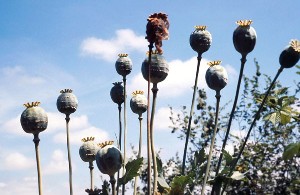|
Newsbrief:
US
Backs
Off
from
Afghan
Aerial
Spraying
as
Anti-Opium
"Jihad"
Gets
Underway
1/28/05
The United States will not resort to the aerial spraying of herbicides as part of its effort to suppress the Afghan opium crop -- at least for now. The State Department had asked Congress for $780 million in anti-drug assistance for Afghanistan, the world's leading opium producer, this year, with $152 million allocated for aerial eradication. Instead, administration officials and congressional insiders told the Los Angeles Times, the US approach will concentrate on manual eradication, alternative development programs and increasing the size of Afghan anti-drug police forces.
Secretary of State designate Condaleeza Rice confirmed as much in her Senate confirmation hearings last week. "At this point, manual eradication is all we can do, but we'll see whether aerial is needed," she said. While drug war hawks in the State Department and Rice's old fiefdom, the National Security Council, argued for the spraying, policymakers ended up heeding both Karzai and in-house critics. "Everybody supports an aggressive program on drugs including manual eradication, interdiction and alternative livelihoods," a congressional source who asked to remain anonymous told the Times. "But the idea of US military helicopters swooping down on villagers... stirred up memories of what the Russians did in the '80s," when Soviet helicopter gunships strafed villages. That still leaves plenty of ways to burn $780 million. According to the Times, the scramble is now on as advocates of more funding for seed crops square off against advocates of more spending on manual eradication -- and the expensive guns and soldiers required to carry out the unpopular task. Rep. Tom Lantos (D-CA) suggested public outreach and going after more heroin-producing labs. "More money needs to be spent on public outreach and on going after drug labs and caches," Tom Lantos said in a statement. "We must also realize that this is a long-term commitment, and not just a simple one-time expenditure. But this terrible trade is funding the Al Qaeda and Taliban forces that are shooting at our troops and trying to undermine the Karzai government. This is a battle we cannot afford to lose." Ironically, Afghan opium expert Barnett Rubin of New York University told the Times, opium prices had dropped after last year's bumper crop, but have now quadrupled on the expectation eradication would result in a smaller crop this year. Because opium is durable and can be hoarded until the price is right, drug traffickers "are big supporters of crop eradication right now," said Rubin. "The net result of crop eradication will be a net transfer of income from opium growers to drug traffickers," he said. Meanwhile, Afghan opium growers have won an endorsement of a different sort: The Pakistan Daily News reported that Mufti Munir Shakir, "a reknowned religious scholar," has declared the opium trade "halal," or legitimate within Islamic teaching. Shakir, who lives in Pakistan's tribal Kyber Agency area adjacent to the Afghan border, broadcast his remarks on a local FM radio station widely listened to in the area. According to Shakir, the cultivation and trade in opium is legitimate because it is mostly used for medicinal purposes. Anything that could have a positive benefit on human beings could not be declared illegitimate or prohibited under Islamic law, he said.
PERMISSION to reprint or redistribute any or all of the contents of Drug War Chronicle (formerly The Week Online with DRCNet is hereby granted. We ask that any use of these materials include proper credit and, where appropriate, a link to one or more of our web sites. If your publication customarily pays for publication, DRCNet requests checks payable to the organization. If your publication does not pay for materials, you are free to use the materials gratis. In all cases, we request notification for our records, including physical copies where material has appeared in print. Contact: StoptheDrugWar.org: the Drug Reform Coordination Network, P.O. Box 18402, Washington, DC 20036, (202) 293-8340 (voice), (202) 293-8344 (fax), e-mail drcnet@drcnet.org. Thank you. Articles of a purely educational nature in Drug War Chronicle appear courtesy of the DRCNet Foundation, unless otherwise noted.
|
||||||||||||||||||||||||||||||||||||||||||||||||||||||||||||||||||||||

